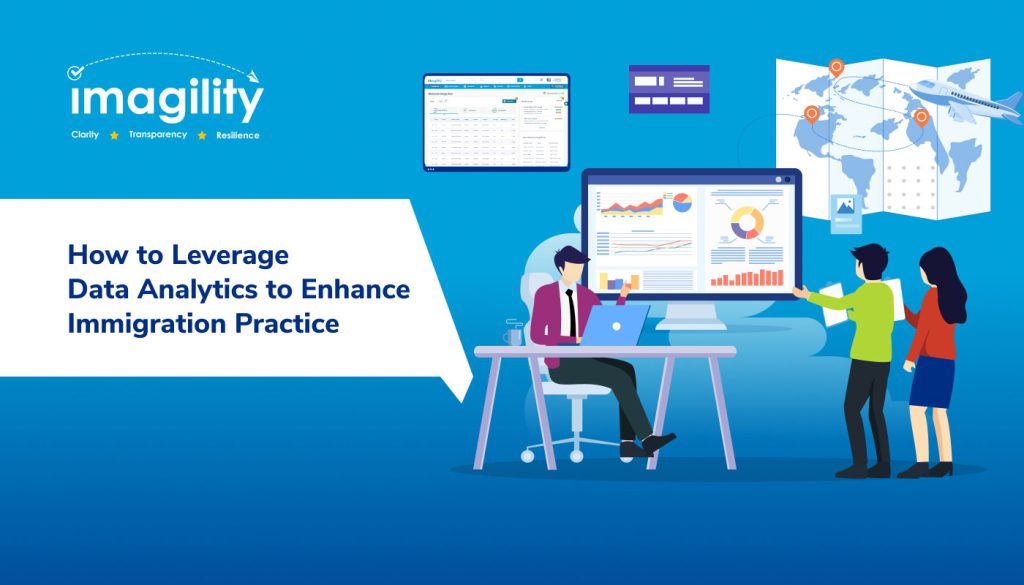Table of Contents
Types of Data You Must Collect
- Demographic Information
- Case Progress Tracking Data
- Outcome Analysis Data
- Immigration Policy Changes Data
- Financial Data
Data analytics has become a crucial component for the exponential growth and success of any sector. In the absence of data analytics, businesses may still generate profits, but they will overlook the opportunity for advancement and market capitalization. Whether we consider industries such as healthcare, finance, telecommunications, or any other, all harness the potential of data analytics to acquire information and apply it to enhance client services.
As an immigration attorney, not incorporating the capabilities of data analytics means missing out on valuable insights into the progress of your client base. Data analytics empowers you to gain a deeper understanding of various factors, including client demographics, specific case challenges, as well as information related to petitions, deadlines, and documentation.
In this blog, we will guide you through the various data types that can be valuable for your immigration practice when collected. We will also explore how harnessing data analytics can provide in-depth insights into these variables, empowering you to build a stronger case.
Let’s start
Types of Data You Must Collect
Below are some of the crucial data that you must collect and analyze to give better services to your clients.
1. Demographic Information
Demographic data is essential for understanding the characteristics of your client base. This includes information such as age, gender, nationality, education level, and occupation. By collecting demographic data, immigration attorneys can identify trends and patterns among clients, helping them tailor their services to specific groups more effectively.
For instance, if a law firm notices a growing number of clients from a particular country, it may decide to offer specialized services or resources in the native language of that demographic.
2. Case Progress Tracking Data
Monitoring the progress of immigration cases is crucial for efficiency and client satisfaction. This data should include details about the stage of each case, important deadlines, and any obstacles or delays encountered.
By tracking case progress, immigration attorneys can identify bottlenecks in their processes and take corrective actions to improve efficiency. This data also helps in managing client expectations by providing accurate information about the timeline and status of their cases.
3. Outcome Analysis Data
Outcome data pertains to the results of immigration cases, including approvals, denials, or other dispositions. It’s essential to track and analyze these outcomes to identify factors contributing to success or challenges. By analyzing outcome data, immigration attorneys can identify patterns in the types of cases that are more likely to be approved or denied. This information can inform strategy and case preparation.
Understanding the reasons behind case outcomes can help attorneys provide more accurate advice to clients, increasing the chances of successful applications in the future.
4. Immigration Policy Changes Data
Immigration policies and regulations are subject to frequent changes. Collecting data on policy changes, such as new laws, regulations, or executive orders, is critical for staying up-to-date. Immigration attorneys must monitor policy changes to ensure they provide accurate advice and assistance to clients. By tracking policy changes, practitioners can proactively adapt their strategies and inform clients about potential impacts on their cases.
5. Financial Data
Collecting financial data is an important aspect of data analytics for immigration practice. Financial data in this context refers to information related to the financial aspects of immigration cases, both for the clients and the law firm. Let’s take a closer look at each category:
- Client Financial Data
Income and Assets: Gathering data on clients’ income, assets, and financial stability is essential, as it can impact their eligibility for certain immigration pathways. For example, income and financial assets are often considered when applying for family-based or employment-based visas.
Payment History: Maintaining records of client payments and payment histories is essential for accounting purposes. It helps track outstanding balances, manage cash flow, and ensure that all financial transactions are transparent and compliant.
- Law firm Financial Data
Costs and Expenses: Law firms must track their operational costs and expenses for handling immigration cases. This includes staff salaries, office space, legal research tools, and marketing expenses.
Revenue Tracking: Monitoring the revenue generated from immigration cases is critical for assessing the law firm’s financial health. It helps in determining profitability and making informed decisions about resource allocation.
Collecting financial data in immigration practice is crucial for client-facing and operational aspects. This data contributes to the overall success and financial health of the immigration practice.
Conclusion
Data analytics empowers immigration attorneys to meet their clients’ needs more effectively and adapt to evolving immigration policies and regulations. It enables you to navigate the complexities of the immigration landscape with precision, offering clients the best possible guidance and increasing the likelihood of successful outcomes.
By collecting and analyzing a range of data, immigration attorneys can make informed decisions, tailor the services, and streamline operations. You can also leverage the power of top-notch immigration software Imagility to help you analyze various kinds of data and elevate your immigration law practice. Book your free demo now!









